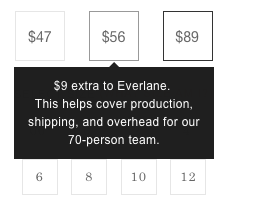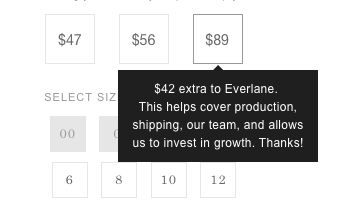Everlane Is Letting Customers Choose How Much to Pay — But There's a Catch

How much do you feel like paying for these pants? Everlane’s latest sale lets shoppers select the price they wish to pay, Fashionista reports.
In a choose-your-own adventure twist, shoppers are presented with three prices for each item on sale.
For instance, the Slim Trouser (pictured right; originally $98) are available for $47, $56, or $89.
But Everlane silently presents you with a moral quandary.
The lowest price comes with a cost: shame.
The nicely discounted $47 option, according to the company’s website, does not grant Everlane a profit.
Given the company’s ethos of transparency, Everlane does not shy away from letting you know where your money goes.
Here’s what happens when you select the $47 option:

Of course, the invisible cost isn’t just your own personal shame, it’s the human cost that comes with cheaper fashion — a price illustrated in this year’s movie, The True Cost.
Here’s what appears when you select the $56 option:

If you select the $89 option, you miss out on the bulk of the sale, but you avoid the shame-shopping and help the company and its employees. You even get a terse, appreciative “thanks!” from the copy team.

It’s an interesting concept — generally, sales indicate excess inventory that, for whatever reason, can no longer be sold at full price. (This is why stores with consistent steep markdowns often yield poor results — look at recent fallen retail stars Banana Republic and J. Crew for proof.) But this moral positioning could position Everlane with the opportunity to profit even more.
Everlane has become known for its cost transparency; it is one of the core tenets upon which the brand was built.
On its website, the company openly breaks down how much it costs to make its clothing (labor, materials, transporting the apparel, and duties). It compares its prices with those of traditional retailers. One dress, for instance, is $98 at Everlane, and Everlane claims traditional retailers would sell the dress for $190. The retailer also keeps costs down by operating strictly as an e-commerce business, aside from occasional pop-up shops.
More From Business Insider:
This lingerie startup gives workers $10,000 when they quit
The top retailers to watch in 2016
Chipotle is changing the way it makes some of its food after all the E. coli outbreaks

